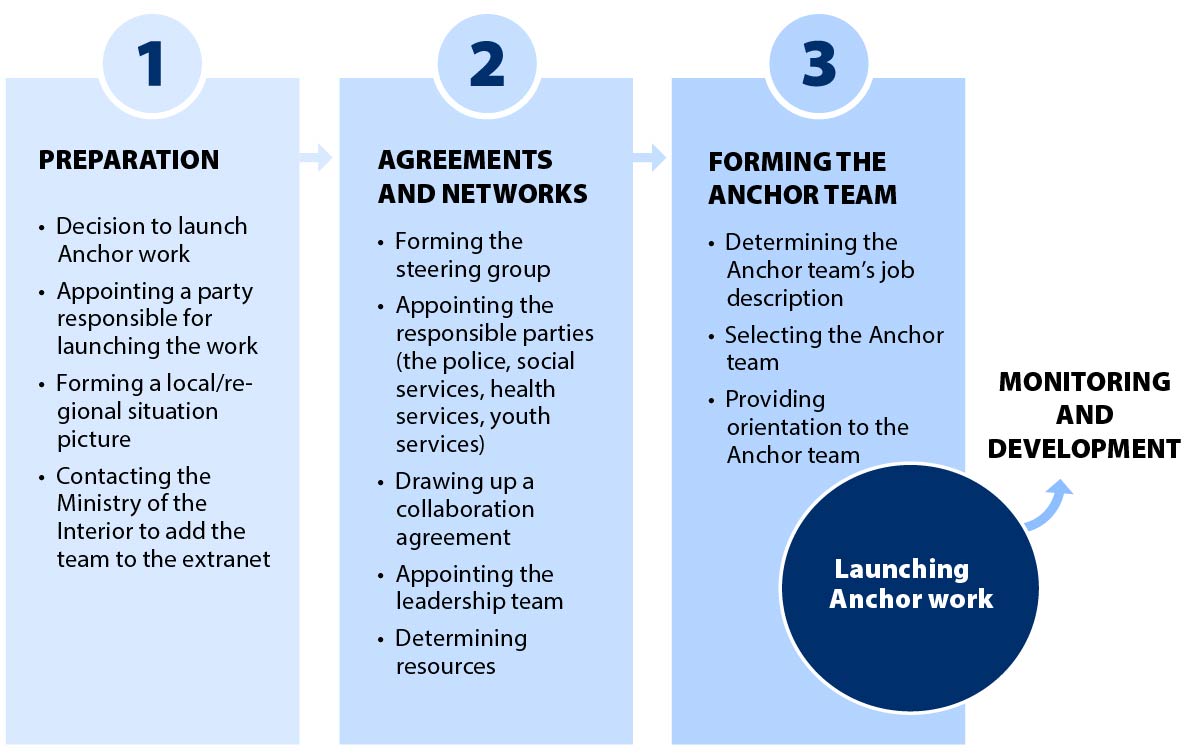Launching Anchor work
The national goal is for Anchor work to be available in all areas and regions. The purpose of this is to ensure that Anchor services are equally available to all adolescents. Anchor work is based on common national principles but it is organised to address local and regional needs and special characteristics. The planning and organisation of Anchor work start from a local or regional decision to launch multi-professional collaboration for early intervention with adolescents and for promoting wellbeing and preventing crime (Figure 5). Before Anchor work can be launched, activities must be prepared, collaboration agreements must be concluded and networks created, the Anchor team must be formed and its preconditions ensured.
Figure 5. Local or regional start-up of Anchor work

Preparation of Anchor work
In the first, preparatory phase of launching Anchor work (Figure 5), the party responsible for organising the work is appointed e.g. from the police, social services, youth services or health services. The person responsible for launching the work ensures that an overview of the situation in the area is created as a basis for Anchor work. The overview is based on reports and accounts concerning the area’s population, crime situation and the state of wellbeing among adolescents. In addition, public and third-sector stakeholders in the area, their expertise, as well as operating models and services related to Anchor work are outlined. (Appendix 8.)
Collaboration agreements
In the second phase of launching Anchor work, collaboration agreements are prepared and action networks created (Figure 5). Anchor work is based on a collaboration agreement between all the organisations participating in the implementation of the work. These can include social services, youth services, health services and the police within the wellbeing services county or municipality/city. The purpose of the collaboration agreement is to create a shared view of the goals, implementation, management and monitoring of Anchor work. The collaboration agreement describes the points of departure of operations, the duties of the participating organisations as well as the types of personnel and other resources that the organisations have. In addition, it includes a description of the way in which funding and costs are shared. As a rule, each participating organisation is responsible for its own costs, including personnel salaries, training and travel. In addition to any other aspects, the agreement sets out how the work is managed and monitored. (Appendix 9.)
The basic principles governing Anchor work are revised in connection with the collaboration agreement, including matters concerning confidentiality and the exchange of information. In addition, a local or regional steering group and a leadership team are formed for Anchor work (Figure 5).
Content areas of the collaboration agreement
Starting points and nature of the work:
- Purpose of multi-professional cooperation
- Local or regional work
Resources:
- Staff, work facilities and other resources
- Information systems
- Division of costs and financing/invoicing
Management and monitoring:
- Organisation of management
- Monitoring and assessment of work
Other matters to be agreed:
- E.g. orientation, work guidance
- Validity of the agreement and settlement of disputes
Forming the Anchor team
The Anchor team is formed in the third phase of launching Anchor work (Figure 5). The job descriptions of the Anchor team professionals are defined and suitable experts are selected for the tasks. Joint training is organised for the team. The training covers key topics of relevance to Anchor work, i.e. adolescents, early intervention, prevention, criminal behaviour, violent radicalisation and extremism, as well as multi-professional collaboration and legislation. In addition, care is taken to ensure that all the stakeholders are familiar with their own and the other team professionals’ tasks as well as the collaboration agreement and its role in the work. When forming the Anchor team, it is ensured that the team members know the principles required in information exchange, information systems, premises and other practices. Knowing local and regional partners supports the implementation of the work. In addition, becoming familiar with the work of other Anchor teams helps plan and launch work in the team’s own area. In the start-up phase, joint statistical procedures, monitoring and assessment are agreed. These are used as a basis for continuously developing the work to address the needs of the adolescents in the area.